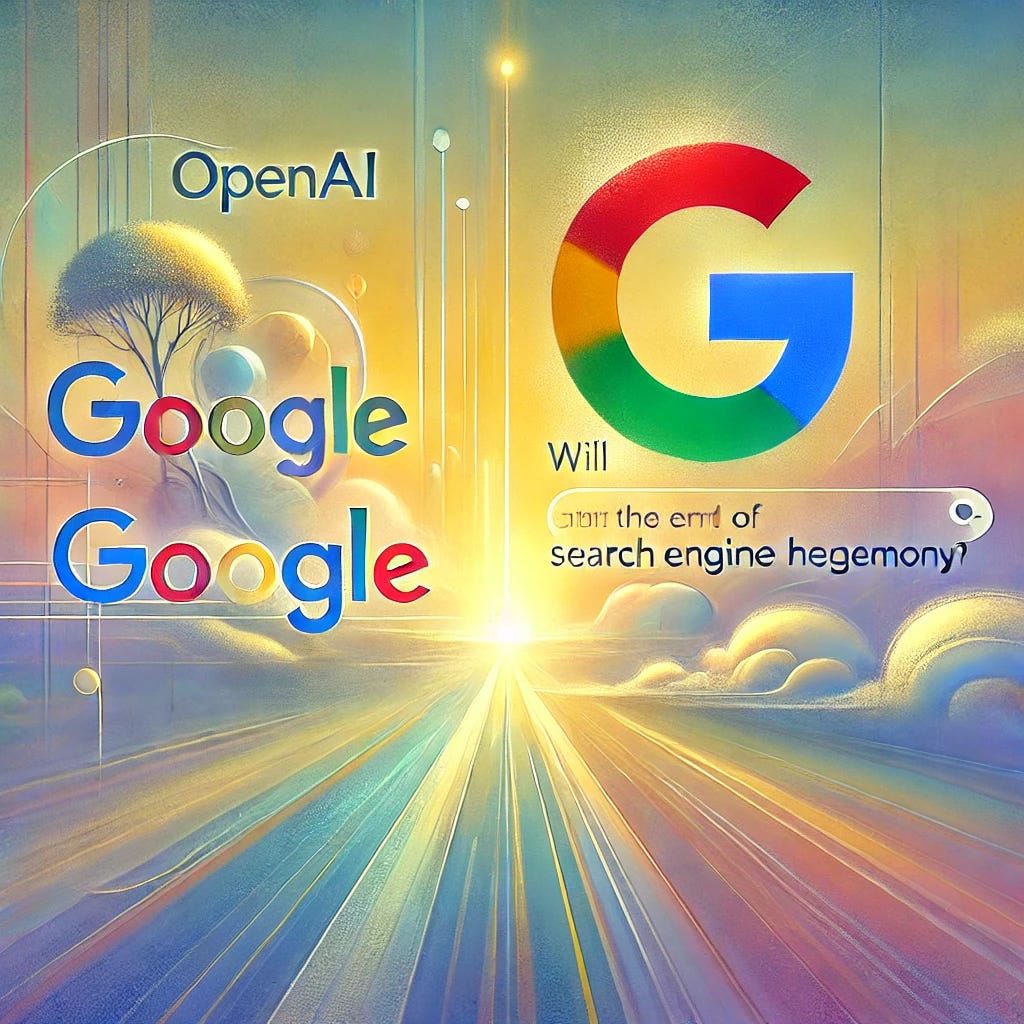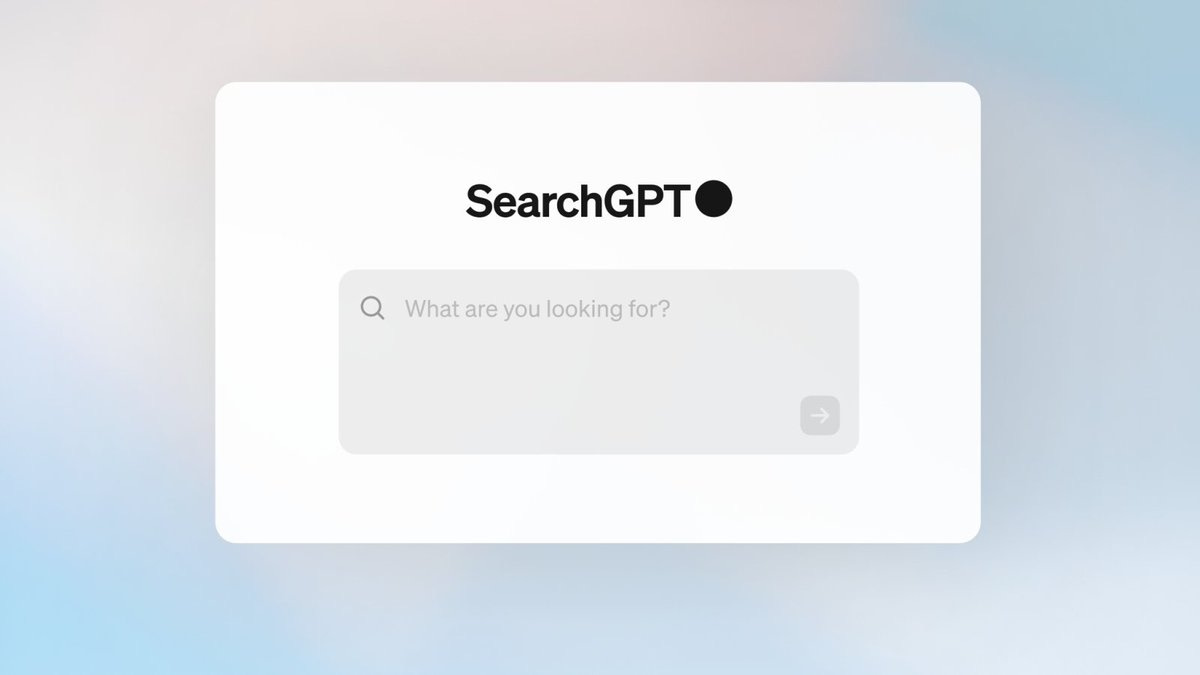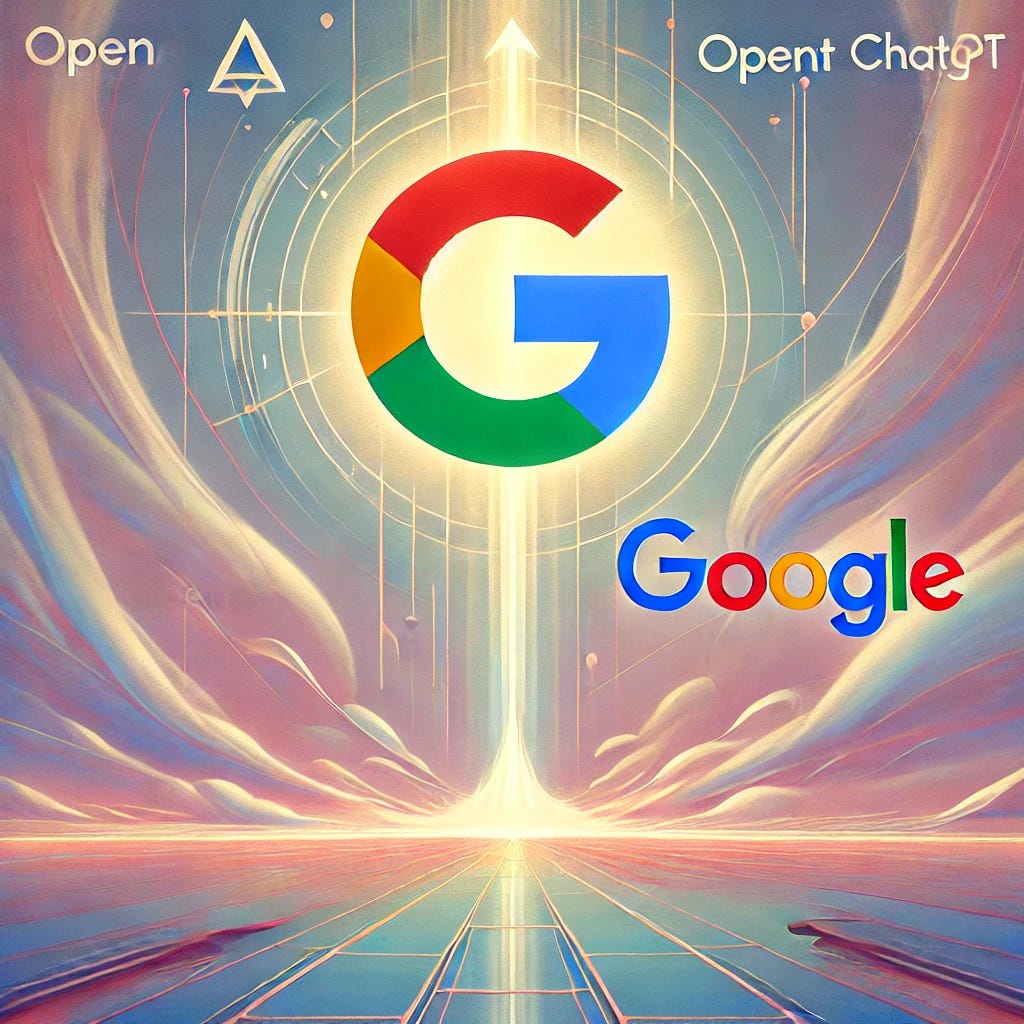Will SearchGPT Mark the End of Google's Search Engine Hegemony?
The Launch of SearchGPT Prototype by OpenAI: A New Era in Search Engine Competition.
Introduction
OpenAI's introduction of SearchGPT marks a significant development in the search engine market, long dominated by Google. This new entrant aims to potentially revolutionize how users interact with search engines by leveraging advanced conversational AI technology. Here, we delve into the key features of SearchGPT, its implications for Google's market dominance, and the broader impact on the tech industry, and what it means for a user like you and me.
Launch and Competition with Google
On Thursday, July 25, 2024, OpenAI unveiled the prototype of SearchGPT, positioning it as a direct competitor to Google's search engine. Sam Altman, CEO of OpenAI, posted about SearchGPT on X (formerly Twitter) on the same day. In his post, Altman stated: "We think there is room to make search much better than it is today. We are launching a new prototype called SearchGPT." The announcement was made through both a blog post on OpenAI's website and Altman's social media post. Google's search engine currently controls approximately 90% of the market share, making this move by OpenAI a bold and aggressive challenge. This announcement signifies a strategic shift in the search engine landscape, potentially disrupting Google's long-held near-monopoly.
Key Differences from Google Search
a.) Conversational Interface
One of the standout features of SearchGPT is its conversational AI approach. Unlike traditional search engines that rely on keyword-based queries, SearchGPT allows users to ask questions in natural language and follow up with additional context-based queries. This interactive dialogue capability aims to provide a more intuitive and user-friendly search experience.
b.) Concise Answers
SearchGPT focuses on delivering concise answers, summarising information and providing relevant links. This contrasts with Google's approach, which typically presents pages of related links, requiring users to sift through information to find what they need.
c.) Real-time Information
To enhance its conversational capabilities, SearchGPT integrates real-time web information. This feature ensures that users receive the most current and accurate data available, addressing a common limitation of traditional AI-search engines. This is a significant improvement over ChatGPT, which relies on a cut-off date in its training model. The most recent version, GPT-4 Turbo, has a knowledge cutoff of April 2023.
d.) Clear Attribution
SearchGPT's responses include clear, in-line named attribution and links to sources. This transparency in sourcing is designed to build trust and provide users with easy access to the origins of the information presented. This is especially useful for academic research and professional journalism.
e.) Ad-free Experience
Currently, SearchGPT offers an ad-free experience, prioritising high-quality content over monetisation through advertisements. This focus on user experience sets it apart from Google, which heavily relies on ad revenue.
f.) Pricing and Availability
As SearchGPT is still in its prototype phase, there is no information available regarding its pricing. It is being tested with a limited group of users, and further details are expected as the product moves closer to a full launch.
Impact on Google's Stock Performance
Following the announcement of SearchGPT, Alphabet (GOOGL), Google's parent company, experienced a significant stock decline of approximately 5.03% on Thursday. This drop was attributed to two main factors:
a.) Quarterly Results
Despite exceeding analyst expectations for both earnings and revenue in Q2 2024, Alphabet's stock faced downward pressure. The market's reaction underscores the volatility and high expectations placed on major tech firms. The slide was in sync with the tech-oriented NASDAQ and the market favourites, the “Magnificent Seven,” of which Alphabet Inc., the legal name of the listed entity owning Google, is a part.
b.) SearchGPT Announcement
The introduction of SearchGPT contributed to market concerns about Google's future market share and competitive edge, exacerbating the decline in Alphabet's stock value.
Google's Ad Revenue Dominance and Growing Cloud and Network Contributions
Although ads on Search and YouTube continue to contribute massively to Google's topline in Q2 2024, with Google Services generating $69,984 million (87.7% of total revenue) and Search & other ads bringing in $44,026 million (55.2% of total revenue), the contributions of Google Network and Cloud services are not insignificant. Google Network generated $7,626 million (9.6% of total revenue), while Google Cloud brought in $9,563 million (12% of total revenue) and achieved an operating income of $395 million. Establishing these segments requires significant time and investment in trans-oceanic and terrestrial cables for internet infrastructure and state-of-the-art data centres. Hence, Google's virtual monopoly cannot be easily shaken by the introduction of SearchGPT, although it is surely a threat that cannot be underplayed.
Future Outlook for Google Stock
a.) Ongoing AI Competition
Google is facing increasing competition in the AI space, with SearchGPT being the latest entrant. This growing competition could pressure Google to innovate and adapt rapidly to maintain its market position.
b.) Strong Financial Position
Despite the recent stock decline, Alphabet remains financially robust, reporting an 11% increase in advertising sales, reaching $64.6 billion in Q2 2024. This strong financial performance could provide a buffer against market uncertainties. The company is also in the process of laying off approximately 20% of its workforce, leveraging AI-oriented products to handle laborious tasks like coding. This strategy is expected to improve the bottom line and send a positive signal to the stock market.
c.) Gemini and AI Integration
Google continues to enhance its search capabilities through AI integration. The recent incorporation of its Gemini model into search via the AI Overviews feature is a testament to its commitment to maintaining technological leadership. Google insiders working in the "DeepMind" division assert that the company is working virtually 24/7, and a significantly improved version of GoogleAI’s Gemini can be expected in the coming weeks and months. This development is anticipated to shake the AI landscape profoundly.
d.) Market Dominance
Google's significant lead in the search market is a stabilising factor. Its entrenched position and extensive user base offer resilience against new challengers like SearchGPT.
e.) Investor Sentiment
The tech sector, including Google, is experiencing volatility due to concerns about overvaluation and increased competition. Investor sentiment will likely fluctuate as the impact of new technologies and competitors becomes clearer.
OpenAI's Financial Strain and Cost per Query
OpenAI is facing significant financial challenges, with a projected loss of up to $5 billion in 2024, translating to a burn rate of approximately $416.67 million per month or $1.25 billion per quarter. AI training costs alone are expected to reach $7 billion, with an additional $1.5 billion in operational expenses. Maintaining ChatGPT's operations costs about $700,000 per day, amounting to roughly $255.5 million annually. The cost per query for ChatGPT-4 varies, with the GPT-4 (8K context window) costing $0.03 per 1,000 tokens for input and $0.06 per 1,000 tokens for output. For example, a query involving 1,000 input tokens and generating 2,000 output tokens would cost $0.15. Given these substantial expenses, OpenAI will eventually need to explore new sources of income to first survive, thence thrive.
Ex-Googler’s Take on SearchGPT's Challenge
Himself an ex-Googler in the rank of a Senior Product Manager, our honorary tech adviser, Bilawal Sidhu, based out of Austin, Texas, said that in the medium run, SearchGPT will either have to start selling ads or adopt a subscription model, as its current business model is financially unsustainable. Sam Altman's announcement to keep the new search engine ad-free suggests that a switch to the subscription model is likely sooner or later. On the other hand, Google search is free, and users do not find its ads intrusive. Advertisers also benefit from lower costs, about 10% of what closest competitors charge, while enjoying better click rates. "The Google Titanic might have been hit by the huge wave created by the announcement of SearchGPT on Thursday, but it ain't going to hit a tsunami or an iceberg anytime soon," Sidhu told us.
Google's Strategic Investment in Anthropic to Hedge Risks
In order to hedge its risks, Google has invested a significant sum in the highly-rated startup Anthropic, securing about 10% of the equity with a potential investment of up to $2.5 billion. Google's latest commitment includes an immediate $500 million investment, with an additional $1.5 billion planned over time. This is on top of a previous $550 million investment earlier in the year, bringing Google's total investment to approximately $2.5 billion. Anthropic's latest release, Claude Sonnet, is already receiving rave reviews from users and poses significant competition to ChatGPT-4 and Google Gemini.
Major investors in Anthropic include Amazon, which plans to invest up to $4 billion, and several impact investors such as the Ford Foundation, Omidyar Network, and Nathan Cummings Foundation, contributing a combined $7.5 million. Other notable investors include Dustin Moskovitz, Jaan Tallinn, and the Center for Emerging Risk Research. Anthropic has raised nearly $7 billion in funding this year alone, and its valuation, reported to be around $4 billion earlier in the year, has likely increased significantly with these recent large investments.
Summing Up and Looking Forward
The launch of SearchGPT presents a formidable challenge to Google's dominance in the search engine market. While it is too early to determine the long-term impact of this new competition, Google's strong market position and ongoing AI developments suggest it will remain a significant player. Investors and industry watchers will be keenly observing how the competition unfolds and its effects on Google's market share and revenue in the coming quarters. The improved Gemini model is also highly anticipated by users. While it is easy for any David to challenge the tech-Goliath, defeating it would be a tall order. In the meantime, users like you and me can sit back and relax, enjoying a better experience at negligible cost.







